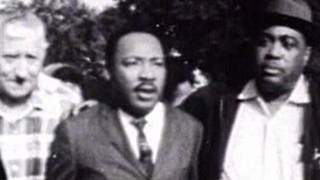
Guests
- Peter Rickmanactivist with the Teaching Assistants’ Association at University of Wisconsin-Madison.
The Wisconsin Assembly is set to begin debate today on Republican Governor Scott Walker’s plan to cut pay and eliminate collective bargaining rights for public employees. The unions have agreed to accept all of Walker’s proposed cuts, which would see them pay 12 percent of their health benefits and half their pension costs. But they have refused to relinquish their right to collective bargaining. We speak to Peter Rickman, an activist in the Teaching Assistants’ Association at the University of Wisconsin, Madison, who has helped occupy the Capitol building in Madison for the past week to protest the bill. “People understand that this is a fundamental attack on basic worker rights,” Rickman says. “So, people like … the firefighters, steelworkers and other folks — nurses, home care workers — who are joining us are doing this because this is a struggle for all working folks.” [includes rush transcript]
Transcript
AMY GOODMAN: I wanted to go to Peter Rickman, an activist in the Teaching Assistants’ Association at University of Wisconsin, Madison.
You’ve been at the Capitol building for more than a week. Can you describe the scene there and exactly what you’re demanding? The polls are indicating that Governor Walker is losing support by the day in the stance that he has taken.
PETER RICKMAN: Yeah, sure. Thanks for having me on, Amy.
Well, we’ve been occupying the Capitol here for a week because we’re standing up for, as Reverend Jackson said, the basic fundamental human right to form and join unions. We’re standing up to make sure that worker rights are protected, and we’re standing up to make sure that democracy in our state is protected, too. You know, the focus here is really on [inaudible]. I think a lot of people have concentrated on the fact that we’ve engaged in an unprecedented occupation the State Capitol building, but it’s, see, because all of us, you know, students and workers, are united. I mean, it’s just core fundamental principles that are what animate the difference between, you know, a Libya or an Egypt of a few weeks ago and the United States, where we’re supposed to have democracy and [inaudible] civil rights. This is who we are. This is what we’re fighting for.
AMY GOODMAN: I’m looking at a new labor poll, Peter. According to a new poll taken by the democratic firm Greenberg Quinlan Rosner, sponsored by the AFL-CIO, Change to Win and NEA — “If state workers agree to pay more for healthcare and retirement, as the Governor has asked, do you think they should also have their collective bargaining rights taken away?” — Only 21 percent of respondents said yes; 74 percent said no. Walker’s favorability ratings are underwater in the poll, with 49 percent saying they have an unfavorable impression of the Governor.
What is going to happen today? Today is a serious showdown. Yesterday, we talked with Mahlon Mitchell. He’s head of the firemen’s association, the union. And I know he and about 50 other firemen slept in the Capitol building last night. They brought their kids’ teddy bears there. He slept right under the famous Robert La Follette statue that’s there. And they’re there in case the Governor attempts to remove people from the Capitol building today?
PETER RICKMAN: Yeah, we’ve started to see an even larger influx of late of people like Mahlon and the firefighters and the United Steelworkers and a host of other people who are engaged in the struggle throughout the rest of the day, and they’re saying that holding the Capitol with us overnight is an important part of continuing the fight for worker rights in our city. We’ve had people from all walks of life there throughout. This isn’t just students or, in our case, graduate assistants occupying the Capitol. But I think it’s becoming more and more high-profile as the pressure ramps up, as we approach some legislative action on this. There’s pressure for the police, who have actually been our allies in this. There’s pressure on them to have the occupation removed, because it is just dramatizing the struggle that we have.
You know, there’s more workers than non-workers in our country and in our state, so I’m not surprised to see the numbers move like this. People understand that this is a fundamental attack on basic worker rights, it’s a fundamental attack on the things that make it possible for economic justice. So, people like Mahlon, the firefighters, steelworkers and other folks — nurses, home care workers — who are joining us are doing this because this is a struggle for all working folks.
AMY GOODMAN: Well, I want to thank you very much, Peter Rickman, for joining us, Peter Rickman of the Teaching Assistants’ Association at the University of Wisconsin, Madison.












Media Options